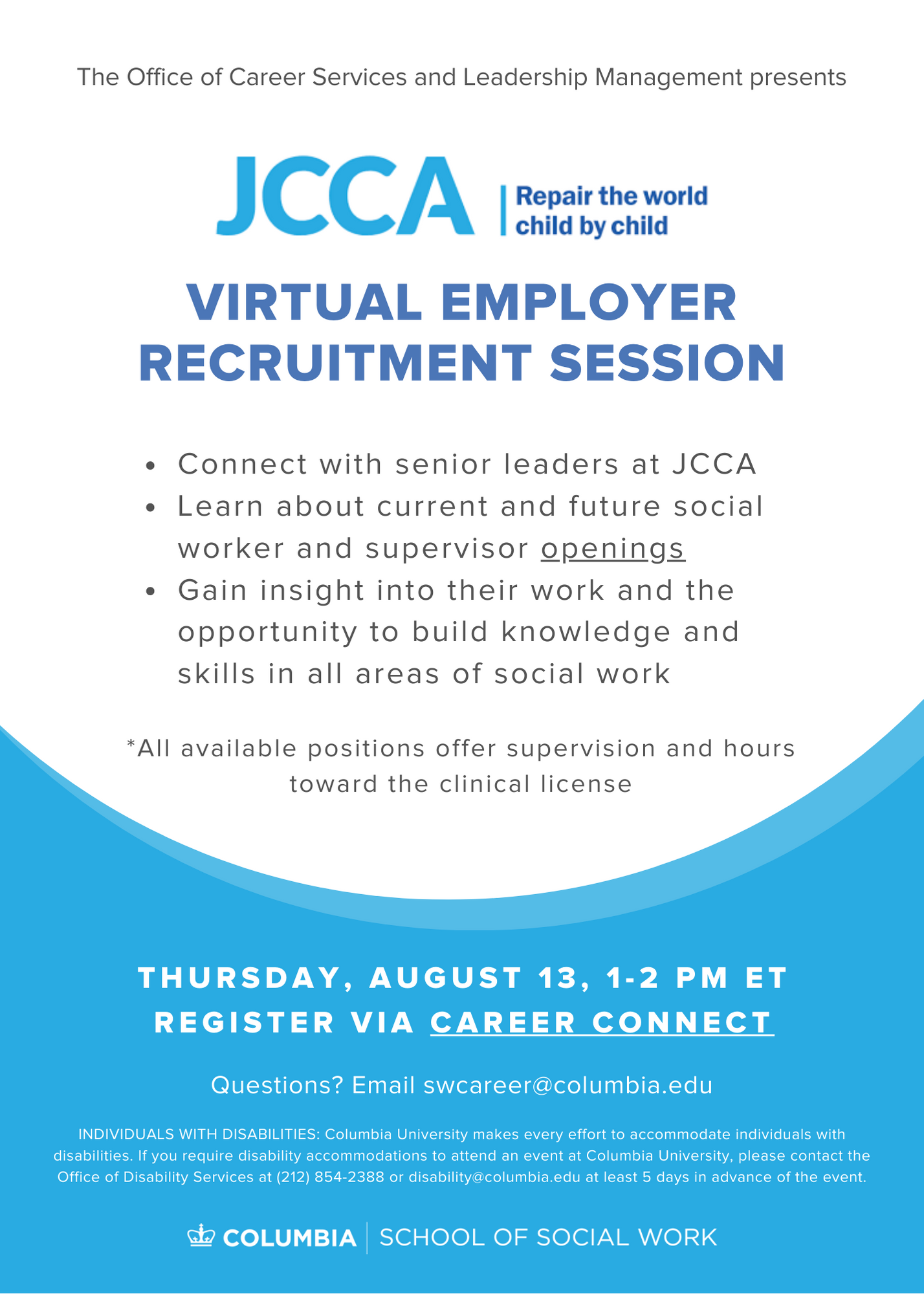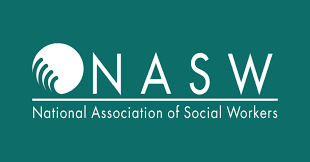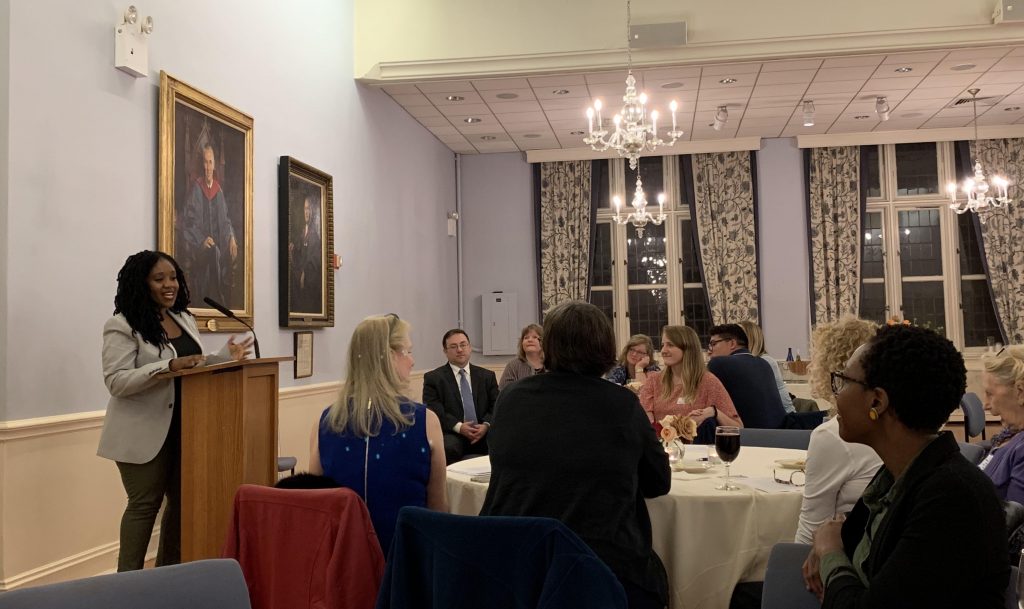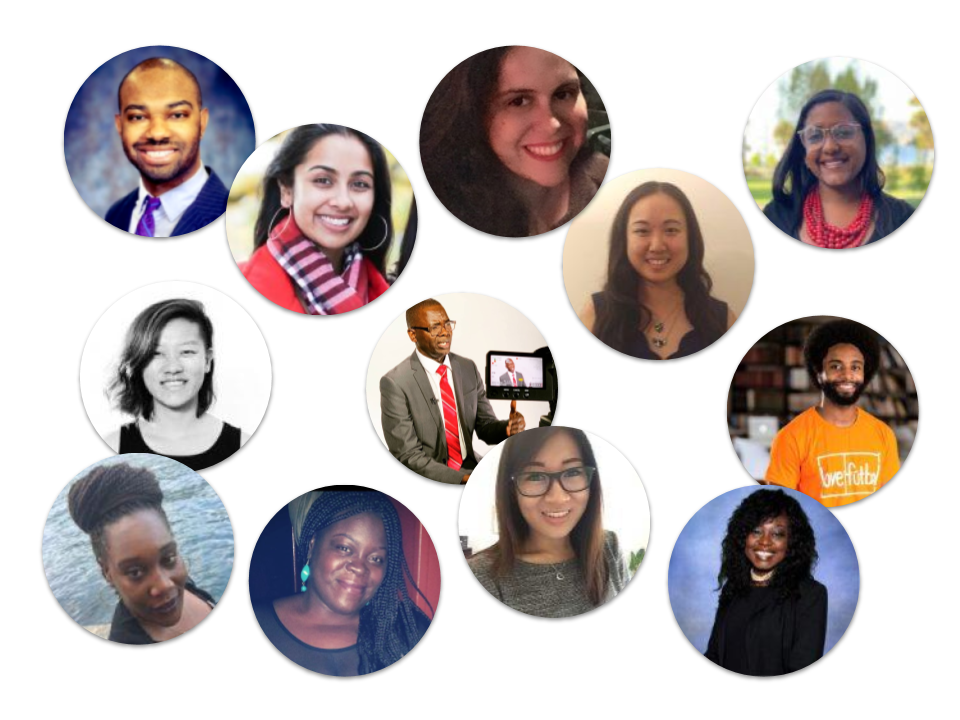Interested in ensuring the safety and well-being of New York’s most vulnerable children and families?
Attend our upcoming recruitment session with JCCA on Thursday, August 13, 1-2 PM ET. They are actively recruiting graduates for immediate openings across various foster care and prevention programs, as well as students graduating in Spring 2021 for openings anticipated in the future.
To receive a link to the event, register via Career Connect.
JCCA helps abused, neglected and traumatized children heal physically and emotionally through compassionate, quality care. Its 37 programs include foster care, residential treatment facilities, mental health services, case management, education programs and special services for children who have been the victims of sexual abuse.At this event, you’ll have the exclusive opportunity to:
-
- Connect with senior leaders at JCCA
- Learn about current and future social worker and supervisor openings across various foster care and prevention programs
- Gain insight into their work and their investment in the professional development of their staff, including the opportunity to accrue hours towards the clinical license
Supporting children and families is incredibly important work and provides opportunities to build critical skills and experience that are transferable to all areas of social work, including knowledge of public systems. Learn more about their work and opportunities at https://www.jccany.org/who-we-are/employment/.
Questions? Contact us at [email protected]. See below for more information regarding the presenters.
INDIVIDUALS WITH DISABILITIES: Columbia University makes every effort to accommodate individuals with disabilities. If you require disability accommodations to attend an event at Columbia University, please contact the Office of Disability Services at (212) 854-2388 or [email protected] at least 5 days in advance of the event.
>>>>
About the Presenters
Lorraine Stephens, LCSW, Senior Vice President, Foster Home and Preventive Services
Lorraine served as the Deputy Commissioner of ACS’s Division of Family Permanency Services, and later became the first Deputy Commissioner of the NYC Department of Homeless Services. Lorraine was Vice President of Strategic Planning, Government Relations, and Special Initiatives at New York Women’s Foundation. She currently serves at JCCA’s Senior Vice President of Foster Home and Preventive Services.
Kirsten Cooper, LCSW ’05, Assistant Vice President, Foster Home Services
Kirsten has been with JCCA for 15 years. She began with her BSW internship at JCCA in 2004, and then went on to pursue her MSW from Columbia in 2005, when she returned to JCCA to complete her MSW field placement. Following her internship, she was hired as a social worker in the adoption unit where she worked for two years until being promoted to her first supervisory position as a Social Work Coordinator in after-care. She eventually moved laterally to a different supervisor role in therapeutic foster care and continued to be promoted to her current position.
Antoinette Bryce, LCSW, Program Director, Unaccompanied Minor Program, Adoption and KinGap Unit, Child Success New York
Antoinette started at JCCA in 2010 as a Case Associate and went on to earn her MSW through the support of JCCA professional development programming. Throughout the last ten years, she has held multiple positions both laterally and as a result of promotions. These roles included: Permanency Specialist, Family Preservation Specialist, Adoption Coordinator, Administrative Supervisor, Assistant Program Director, and finally Program Director overseeing three separate units at JCCA.
Lynanne Bruun, LCSW, Borough Director, Brooklyn Preventive Services, Brooklyn Child and Adolescent Guidance Center
Lynanne started with JCCA in 2011 as a social worker in the Foster Home Services (FHS) group homes program. She moved up to a supervisor position in the FHS CSNYC program in 2014. She then made a lateral move to be a supervisor at the clinic in 2016, and in 2018 was promoted to Borough Director where she now oversees a preventive program, FTR, as well as the clinic and Second Chances.





 Congratulations, Class of 2020! YOU DID IT!
Congratulations, Class of 2020! YOU DID IT! Although the semester will be coming to a close, the Office of Career Services and Leadership Management will remain open throughout the summer to support your career needs, with appointments remaining available Tuesdays through Thursdays. Take a look at our availability on
Although the semester will be coming to a close, the Office of Career Services and Leadership Management will remain open throughout the summer to support your career needs, with appointments remaining available Tuesdays through Thursdays. Take a look at our availability on 
 We hope everyone is staying safe and well.
We hope everyone is staying safe and well.



 Yesterday, at our 2nd annual
Yesterday, at our 2nd annual